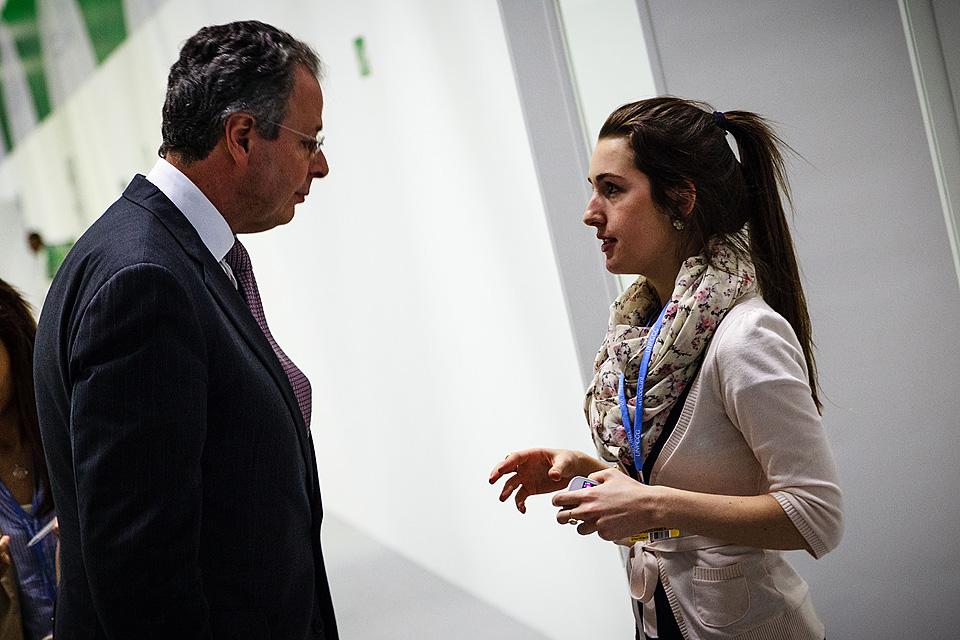Taking a Stand for the Planet

LWF delegation member Raquel Kleber (from Brazil; right) speaks with Ambassador André Corrêa do Lago, head of the Brazilian country delegation at the COP18 climate summit in Doha. © LWF/Sidney Traynham
LWF Youth Urge Concrete Action at Doha Climate Summit
As the latest United Nations climate change negotiations begin in Doha, Lutheran youth from across the globe have converged on the Qatari capital to raise their voices for concrete action, and to bring tangible lessons home to their churches and communities.
“Governments need to take decisions that will benefit all of humanity and look beyond their own immediate national interests,” says Tsiry Rakoto from Madagascar, one of the delegation coordinators. “We are calling for concrete commitments for the reduction of greenhouse gases and the usage of clean energy sources.”
She emphasizes the need for greater commitment to assist developing countries because many communities are already experiencing the catastrophic effects of climate change. “All too often developing countries do not have the means to recover quickly, if at all, from the loss and damage.”
The Lutheran World Federation (LWF) delegation of nine youth aged 21 to 29 attending as observers, represents every region of the world and comes from LWF member churches in Argentina, Brazil, Canada, Germany, India, Madagascar, Norway, Papua New Guinea and Poland. Their participation includes networking in advocacy side events and coordinating with other representatives from ACT Alliance, the World Council of Churches and global youth delegations.
There are among an estimated 17,000 participants expected at the 18th session of the Conference of the Parties (COP) to the UN Framework Convention on Climate Change (UNFCCC), 26 November – 7 December.
Warime Guti, who travelled from Papua New Guinea for the summit, believes climate change is the most important issue for his generation. He asks, “Will nations really commit themselves for the good of all—both in words and in deeds, and both for developed countries and small minority developing countries?”
The Doha negotiations will address a range of issues including work towards a new treaty to replace the Kyoto Protocol, which expires in 2015 and is the only legally binding agreement that commits signatory nations to reduce their greenhouse gas emissions. The conference will also further discussion on climate funding mechanisms, such as the Green Climate Fund, to assist countries affected by climate change.
“Key countries have yet to submit new emission limits and reduction objectives for a renewed treaty, while others have only committed to modest targets,” Rakoto notes.
Putting Youth at the Front and Center
Lutheran young people have long been involved in climate advocacy at international and local summits but the Doha meeting marks a first for the LWF. “These youth are not only members of the LWF delegation to the Doha summit, they are the LWF delegation to Doha,” states LWF General Secretary Rev. Martin Junge.
“As a communion, we have taken the clear decision to put youth at the front and center in our advocacy on climate change because they are presently leaders in our churches and in the future, they are the ones who will inherit the planet that preceding generations leave behind,” he adds.
Rakoto, an international affairs and human rights intern at the LWF Communion Office in Geneva, says that the LWF understands that “young people are major stakeholders.”
Significant New Learning
At Doha, two members of the LWF delegation participated in an early youth constituency event that was attended by the UN’s top climate official, Christiana Figueres. She told the global youth representatives, “Putting your time and energy into mentoring others on this process is the most important thing you can do.”
The delegation sees its most important work as what happens back home. “By participating in the COP18 process, I believe that we have more credibility to influence our churches, communities and governments in the future,” says Rakoto.
Chris Böer, youth nominee of the German National Committee of the LWF, takes seriously Figueres’ point about involvement in the event. He notes that while they are unable to vote, youth monitor the process from the observer section and participate in side events.
“Even with all the significant new learning we are doing as a delegation on these processes and structures, we are excited by the opportunity to be here,” Böer adds.
The LWF delegation’s participation in the COP18 summit builds upon the organization’s long-standing advocacy efforts in the area of climate change. This commitment was re-affirmed in the 2010 LWF Assembly and the LWF Strategy. It also continues the involvement of youth in previous LWF initiatives like the green&just virtual conference held earlier this year.
While the summit may not produce a landmark decision, it is critical to countries and communities already living under the effects of climate change, says Rakoto. “This meeting will set the framework for ongoing state commitments and provide space for increased and concrete action in the future.”
Guti, a member of the LWF Council, believes that climate change is a greater moral issue than any political or economic topic. “It comes down to moral values and whether we stand with the rights of those most affected—the poor and oppressed,” he adds. (839 words)
(By Sidney Traynham, LWF communications coordinator at the Doha summit)
Follow online updates by the LWF delegation:
LWF Youth Blog: http://www.lwfyouth.org
Facebook: http://www.facebook.com/LWFYouth
Twitter: http://www.twitter.com/LWFYouth
Delegation members are available for media interviews. Contact lwfyouthmedia [at] gmail [dot] com or +974 33 387 426.

